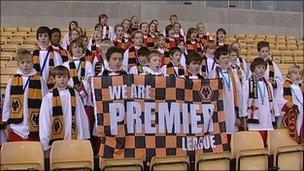Elgar's Wolverhampton Wanderers striker anthem sung
- Published

Club mascot Wolfie conducted a choir in a rehearsal at Molineux
A song by Sir Edward Elgar, which is believed to be one of the first football anthems, has been performed at a concert to raise funds for a church.
The composer, born in 1857, was a Wolverhampton Wanderers fan and cycled more than 40 miles (64km) from Malvern, Worcestershire, to see them play.
Wolves said he wrote He Banged The Leather For Goal in honour of an 1890s striker, Billy Malpass.
The concert was held at St Peter's Collegiate Church in Wolverhampton.
An Evening with Elgar was held in association with Wolves to help St Peter's church as it seeks to raise 拢300,000 to restore an organ dating back to 1860.
Club mascot Wolfie conducted a choir in a rehearsal at the Molineux stadium.
Football anthem
Members of the choir have been wearing Wolves scarves in rehearsals for the event.
The club said He Banged The Leather For Goal was believed to be the first ever football anthem and was written in honour of the striker.
And Land of Hope and Glory, which is among Elgar's best-known scores, has inspired football fans over the years to sing their own words.
The concert was organised ahead of Sunday afternoon's Premier League game against Aston Villa at Molineux. Both clubs were founder members of the Football League in 1888.
Wolverhampton Wanderers FC historian Graham Hughes said Elgar "loved coming" to the area.
"He used to watch the crowd going down to the match," he said.
"Then one Saturday he said he'd like to go down to the match, so he went and that's how it started."
Wolves said Elgar's support for the club stemmed from his admiration for Dora Penney, daughter of the Rector of Wolverhampton.
The current St Peter's rector, the Reverend David Wright, who is also the club chaplain at Wolves, said: "[I'd] love to think that at some point Elgar came into this church and heard this organ played."
Elgar, who was born in Broadheath, a village three miles from Worcester, is famous for a string of symphonies and concertos.
He was largely a self-taught composer and grew up surrounded by music - his father owned a music shop and was a piano tuner.
Elgar, who also taught the violin and played the organ, married one of his pupils, Caroline Alice Roberts, in 1889.